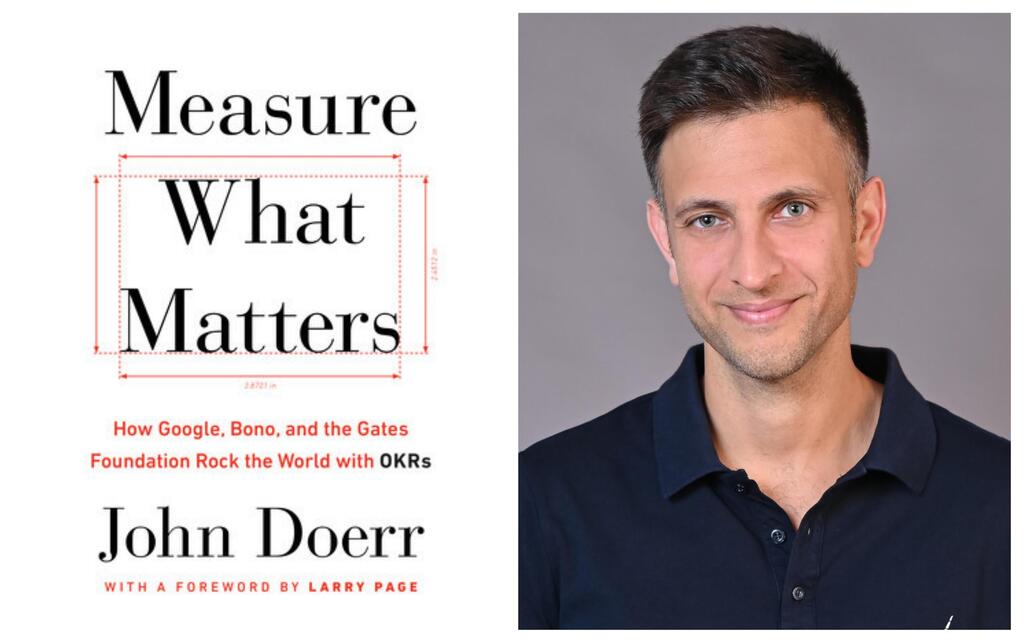Lior Hakimi is the VP Finance at Optimove, a customer-led marketing platform. He has joined CTech to share a review of “Measure What Matters” by John Doerr
Title: “Measure What Matters”
Author: John Doerr
Format: Book
Where: Home
“Measure What Matters” by John Doerr is a groundbreaking book that introduces the concept of Objectives and Key Results (OKRs) as a powerful framework for setting goals and achieving results. Doerr, a venture capitalist and former Intel executive, shares his experiences and insights on how OKRs have transformed businesses and fueled their success.
The book explores how effective goal-setting can drive alignment, focus, and accountability within organizations. Doerr presents real-world examples of companies like Google, Intel, and Airbnb that have leveraged OKRs to drive growth, innovation, and high-performance cultures. He offers practical advice on setting ambitious yet achievable objectives, defining measurable key results, and cascading OKRs throughout the organization. “Measure What Matters” highlights the importance of transparency, frequent check-ins, and continuous learning in the OKR process. It demonstrates how this goal-setting methodology can foster a results-driven culture and empower individuals and teams to make meaningful contributions toward organizational success
The book revolves around several key themes related to the implementation and impact of OKRs:
-
The Power of Focus: Doerr emphasizes the significance of setting clear objectives to align efforts and drive focus toward key results. He illustrates how OKRs can help organizations prioritize and direct their resources effectively.
-
Cascading OKRs: Doerr provides guidance on how to cascade and align OKRs across different levels of an organization, ensuring coherence and alignment of objectives from top to bottom.
-
Stretch Goals and Ambition: The book encourages setting ambitious objectives that push individuals and teams beyond their comfort zones. Doerr explains how OKRs can create a sense of purpose and ignite motivation to achieve extraordinary results.
-
Accountability and Tracking Progress: “Measure What Matters” underscores the importance of accountability and tracking progress towards key results. The book introduces the concept of regular check-ins and provides practical techniques for reviewing and adjusting OKRs as needed.
-
Culture of Learning and Adaptation: Doerr promotes a culture of learning and adaptation, where failures are seen as valuable opportunities for improvement. He highlights the importance of continuous learning and iterating on OKRs to foster innovation and resilience.
“Measure What Matters” has profoundly impacted my understanding of goal-setting with its practical and dynamic approach. Introducing Objectives and Key Results (OKRs) as a powerful methodology has showcased how businesses can successfully navigate complexity and adapt swiftly to ever-changing landscapes. The book’s clear and concise explanation of the OKR process has been instrumental in enlightening me about its remarkable potential to drive growth and foster innovation within organizations.
Beyond mere theory, the book delves into the nuances of cascading OKRs throughout an organization, illuminating the importance of aligning individual objectives with overarching company goals. This comprehensive approach creates a sense of purpose and direction, empowering teams to collaborate seamlessly and work towards shared aspirations cohesively.
One of the most impactful takeaways from “Measure What Matters” is the significance of setting ambitious yet achievable objectives. By daring to stretch beyond conventional limits, organizations can unearth hidden potential and achieve breakthrough results. Doerr’s insights into the psychology behind setting stretch goals have left a lasting impression on me, igniting a renewed commitment to embracing challenges and striving for extraordinary performance.
Moreover, the book emphasizes the criticality of accountability and regular check-ins to track progress effectively. Embracing a culture of transparency and continuous learning enables organizations to identify areas for improvement, celebrate successes, and adapt their OKRs for optimal outcomes. By viewing failures as stepping stones towards improvement, “Measure What Matters” has instilled in me a more resilient and adaptive mindset.
In conclusion, “Measure What Matters” is a game-changer in the realm of goal-setting literature. Its practical wisdom, combined with real-world examples, has equipped me with invaluable insights on implementing OKRs and leveraging them to propel organizational success. Armed with these newfound lessons, I feel better prepared to tackle goal-setting challenges and contribute meaningfully to the growth and prosperity of any organization I am a part of.
Who should read this book:
“Measure What Matters” is a must-read for executives, entrepreneurs, leaders, and individuals seeking to enhance goal-setting practices and drive organizational success. The book’s concepts and techniques can be applied to businesses of all sizes and industries, fostering a results-driven culture and empowering individuals to make meaningful contributions. Whether you are an executive, team leader, or aspiring entrepreneur, this book provides a valuable roadmap for implementing the OKR methodology and achieving measurable results.





